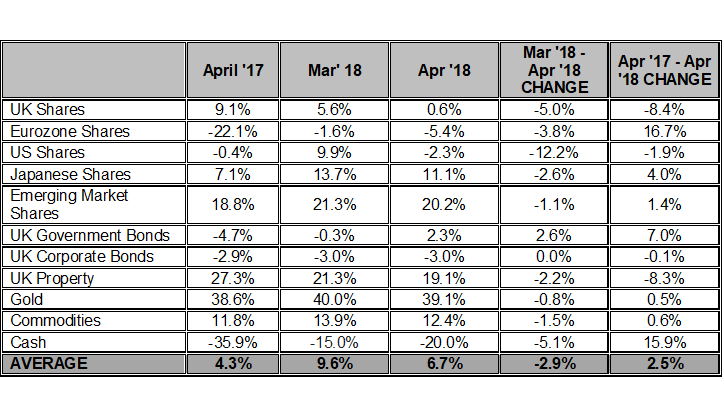Statistics
UK Investors Cut US Equity Exposure Amid Protectionism Worries

Lloyds Private Bank released its investor sentiment index for April, and it seems the trade row between China and the US is souring the mood of UK investors.
US investors have turned more downbeat on US equities because of
worries about rising protectionism noises between the US and
China. A Lloyds Private
Bank measure of investment mood for April showed sentiment on
US stocks slid by 12.2 per cent month-on-month to minus 2.3 per
cent. This is the largest monthly fall since 2013.
Fears of a trade war between the US and China
have escalated, and markets have become volatile; the US is
proposing to slap tariffs on hundreds of Chinese products. China
said it will retaliate with tariffs on various US items.
According to Lloyds PB, US equities were down 2.4 per cent
although they were still 11.7 per cent higher than a year
before. Despite the escalating trade row, sentiment toward
emerging market shares, which include those of China, remained
positive at 20.2 per cent. This remained the highest amongst
global equities.
UK equities
UK shares saw the second largest drop in sentiment, falling 5.0
per cent to 0.6 per cent. Brexit uncertainty continues to
cloud the outlook for UK shares. UK government
bonds saw an increase in positive sentiment (up 2.6 per
cent). Lloyds PB said that gilts benefited from a “flight to
safety amid market turbulence since the start of the
year”.
Japan
Sentiment towards Japanese equities declined by 2.6 per cent in
April, mirroring the 2.7 per cent drop in Japanese
equities.
Overall sentiment towards Japanese investments
remained positive at 11.1 per cent. Lloyds PB
said Japan is a good area of investment, as the Japanese
economy is in robust health and Japanese companies are beginning
to return more of their earnings to shareholders.
“The current political backdrop is unsurprisingly impacting on
global equity markets,” said Markus Stadlmann, chief investment
at Lloyds Bank Private Banking. “A fall in sentiment reflects
investor concerns about the impact of a trade dispute between the
world’s two largest economies, the United States and China. This
uncertainty has caused a repeat of the correction we saw in
February and a flight to safety causing bond prices to stabilise
following declines earlier in 2018. However we believe this
stabilisation will only be temporary and the outlook for bonds
moving forward remains bearish.”
Stadlmann added: “Despite this, most of the world’s economies are
experiencing good growth than we have seen since the financial
crisis of 2008.The recent correction has led to lower share
prices, leading to some attractive opportunities for long term
investors in equity markets and inflation continues to grow
modestly in most developed nations; subsequently the overall
sentiment remains positive."
Source: Lloyds Private Bank Table 1: Net
Sentiment
